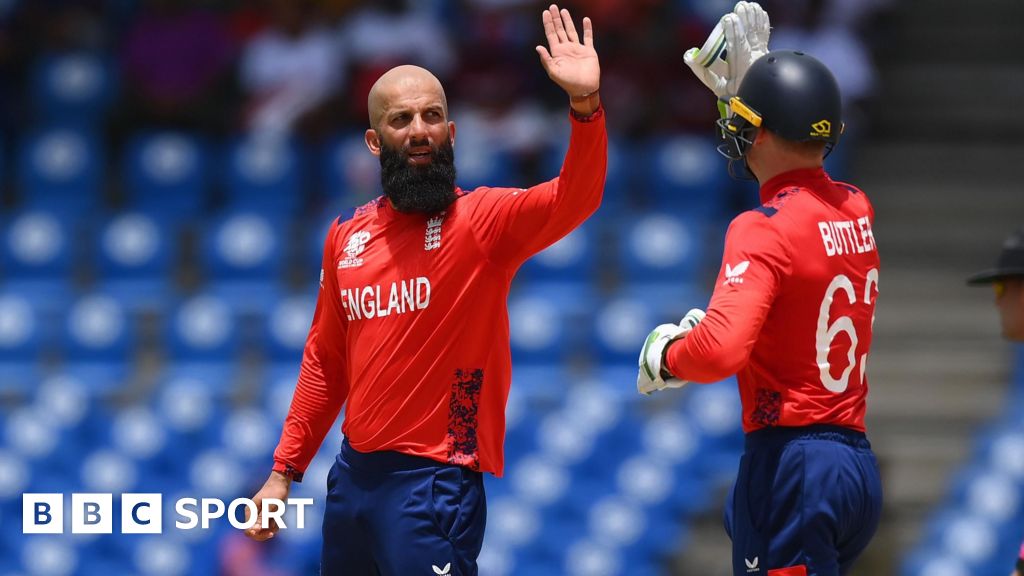- Author, Matthew Henry
- Role, BBC Sport Journalist in St Lucia
Sometimes defeats at a major tournament mean the start of a crisis.
Gareth Southgate would tell you a team does not have to lose for that to be the case.
They picked the wrong team, subjected themselves to an Indian sweatbox at the toss and performed badly. The result was their heaviest defeat in white-ball cricket.
But England’s latest defeat against the Proteas was just that – a defeat.
England captain Jos Buttler has appeared at his fair share of difficult news conferences in recent months.
Some have been tetchy, others just plain sad.
Friday’s, which quickly followed the seven-run defeat at the Daren Sammy Stadium in St Lucia, was not one of those.
This is not the time for England to panic.
“It’s a shame we didn’t go all the way but we did a lot of really good things today,” a measured Buttler said.
While it is true England depart St Lucia with their hopes of a semi-final place in the balance, they do so after a week of more positives than negatives.
Their fans can enjoy Gros Islet’s famous Friday Night Street Party with a degree of comfort.
This World Cup has been a rollercoaster of emotions for England fans – frustration, disappointment, excitement, rain and Scotland-related resignation and tension – packed into less than three weeks.
England recovered excellently with the ball, having been struck for 63 in the powerplay by South Africa opener Quinton de Kock – one of their most regular tormentors in recent years.
Adil Rashid, who spent as much time off the field because of illness as on it the last time the two sides played in that Mumbai thrashing, brought about a halt in scoring that two seasoned Italian centre-backs would have been proud of.
South Africa hit eight boundaries in the first six overs but only one in the next six.
Jofra Archer, the bowler taken down early by De Kock, conceded 21 runs from his first over but only 19 from his remaining three.
England, and South Africa after them, also played their part in providing a match with enough fielding highlights to fill an entire reel.
Harry Brook and Sam Curran took two fine catches, as did Buttler, who also produced what is becoming a trademark run out from the wicketkeeper position.
For a team that looked like an ageing outfit on its last legs in India, they now look re-energised.
The beaming smile of Buttler in the aftermath of the Heinrich Klaasen run out was the opposite of his demeanour even three weeks ago.
Wins against Oman, Namibia and, most impressively, West Indies before this have lifted England’s mood from the terse opening days of the tour and in that moment it broke through.
But, for all of the good, England must improve if they are to win this World Cup to defend their title.
Buttler’s form with the bat – plenty of starts but no fifties in his past six innings – would be a good place to start.
Afterwards the England captain said the two powerplays decided the game.
Having been pushed back by De Kock’s assault, England only managed 41 runs in their six overs, with Buttler hitting a single boundary.
England’s new-ball bowling is their most pressing concern.
They have dragged back innings against Australia, West Indies and now South Africa but eventually they are going to get hurt.
Only 13 wickets have come in the first 10 overs for England bowlers, across their six matches in the Caribbean.
It means their bowling average (36.92) in that phase is the second worst in the competition.
Take out the crushing win against an outclassed Oman and that record reads six wickets in five games at an average of 74.16.
Such numbers are not going to win World Cups.
England are still attempting to find the perfect balance in their XI – in doing so opting for which of their principles they want to lose the least.
Against South Africa and West Indies they have left out all-rounder Will Jacks and as a result looked a ball-striker light, despite having talked up the importance of having batting depth before the tournament.
They have done so because Mark Wood’s pace, Reece Topley’s left-arm angle and Sam Curran’s left-handed batting have been seen as more vital.
“I wanted to have four seam options so that’s the reason for changing the balance,” Buttler explained.
“Sam gives us that fourth seam option and a left-handed batter.”
Wood, who bowled two wicketless overs for 22, may miss out next.
South Africa’s win was also a reminder of the volatile nature of T20s.
England held all of the cards at halfway, gifted them away and won them back, only for South Africa snatch back possession at the death by conceding only 17 runs in the last three overs when 25 were needed.
It is on such fine margins this World Cup will be decided.
Having come through four tight matches to remain unbeaten at this tournament, the Proteas will be one of those fancying their chances.
Australia have looked the strongest side so far but have had their wobbles.
India have progressed unbeaten but debate remains around their issues at the top of their order, in particular.
A new champion will be crowned in Barbados in a week’s time and there is still no clear favourite.
In three meetings against their title rivals England have lost two.
But against South Africa, and in the win prior against West Indies, they showed enough to suggest that if they improve they can still be contenders.

